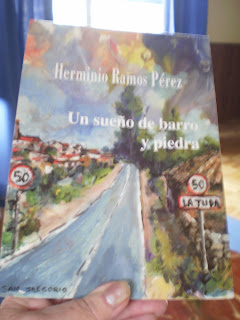
Have you heard the Angels singing?
Lydia the music teacher tipped me off when she drove me to the village school in Corrales: sung music by Vivaldi and Purcell at the cathedral - by a group from London! She couldn’t attend herself. ‘It’s free, so arrive early to get a good seat’, she said.
It was the first time I’d seen the cathedral at night. The impressive dome dominated the skyline, and the interior was a vision of gilded splendour. On a previous visit I’d just wandered round a series of ante rooms, gawping at tapestries of the Siege of Troy, a massive Semana Santa procession platform, elaborately decorated silverware and paintings.
I needn’t have worried about a central position. The sponsors, Caja España, had provided monitor screens so the singers and players could be viewed in close-up – especially when the camera dwelt on a lively blonde first violinist and a handsome countertenor.
The strangest thing, for me, was the bars between the audience and performers – not light, decorative wrought iron, but heavy-duty ones that obscured the view. Some VIPs were allowed on the orchestra side.

While I waited I looked at the programme, with its alluring question on the cover: 'Have you heard the Angels sing?'. Inside was summary in Spanish of the lives of Purcell and Vivaldi, and the words in Spanish and English to the five settings of psalms by Purcell and then a Latin text for the Vivaldi ‘Dixit ….’ There was a short ‘sonata de trompeta’ between Purcell psalms. It was a hollow-sounding instrument of a dull copper colour, like an over-sized Victorian child’s toy.
The line-up for the moving Purcell psalms was a soprano, two counter-tenors and a tall baritone, with the occasional accompaniment from other singers. If there was one fault with the programme it didn’t have photos identifying individual performers, although Peter Pickett the conductor and founder of The New London Consort group was obvious. The concert was the first of four in cathedrals in Zamora, Valladolid, Leon and Palencia.
They saved the best ‘til last, and the Vivaldi, with everyone singing and playing together, was uplifting. Amid the applause that echoed round the roof, did I feel a hint of national pride? Or was it the angels singing?























